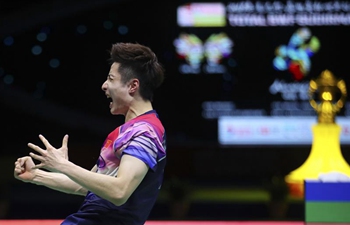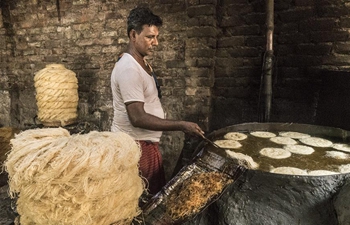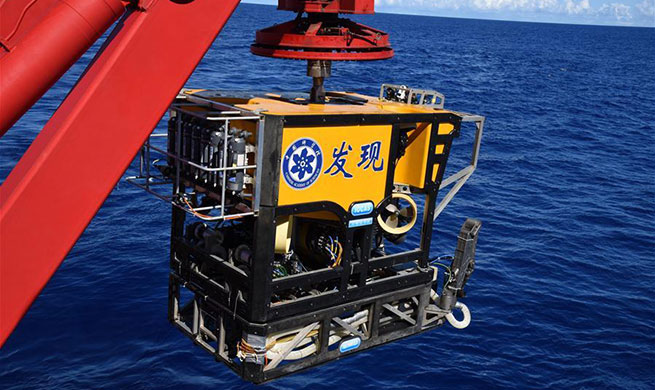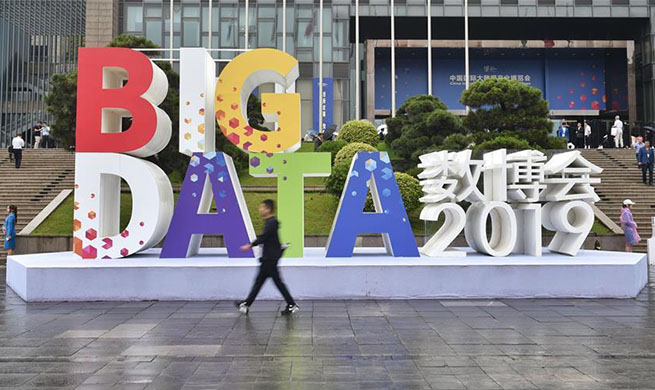By Eric J. Lyman
ROME, May 27 (Xinhua) -- A strong electoral result for Italy's nationalist, Eurosceptic League will give the party the mandate it needs to push for its political agenda, analysts said, but it is also likely to leave Italy more distant and isolated from Europe's political mainstream.
The official vote count gave the League 34.3 percent of the votes to select 76 Italian members of the European Parliament. That was far ahead of the second place Democratic Party, the center-left opposition party that earned 22.7 percent of the votes, and even further ahead of the League's coalition partner, the populist Five-Star Movement, which tallied 17.1 percent of the votes.
The totals for the two parties supporting the government of Prime Minister Giuseppe Conte -- 34.3 percent for the League and 17.1 percent for the Five-Star Movement -- were almost a perfect reversal from last year's general election, when the League earned 17.3 percent of the votes compared with 32.7 percent for the Five-Star Movement.
The total for the League made it the biggest party in Italy for the first time ever, and is a dramatic increase from the 6.2-percent total it earned in the last round of European elections five years ago.
There was speculation ahead of the vote that if the League finished far enough ahead of the Five-Star Movement, League head Matteo Salvini could push for snap elections in order to form a government without the Five-Star Movement.
National elections with similar results would almost let him do it: Like-minded Forza Italia and Brothers of Italy earned 8.8 percent and 6.5 percent of the vote, respectively. The three parties together would fall just short of the 50-percent threshold with 49.6 percent of the votes. But Salvini said he does not want new elections.
Instead, analysts said, he is likely to brush aside objections from its weakened coalition partner and put its new muscle behind its priorities, like the TAV high-speed train line under the Alps between Turin, Italy and Lyon, France; the flat income tax model; and a new security decree that could include even stronger anti-migrant policies.
"There has never been a lot of collaboration between the two parties in the Conte government, and now the League can give less consideration to the Five-Star Movement's priorities or its opposition to the League's priorities," Oreste Massari, a political scientist at Rome's La Sapienza University, told Xinhua.
Though Prime Minister Conte is not a member of either party that supports his government, he was selected by the Five-Star Movement last year. Massari said the League could put pressure on Conte regarding its priorities.
According to Paolo Bellucci, a professor of political science at the University of Siena who focuses on contemporary politics, the League might also push some Five-Star Movement ministers out the door.
"A more assertive League could look to replace Danilo Toninelli, the minister of transportation," Bellucci said in an interview. Toninelli is a member of the Five-Star Movement whose portfolio includes the security of Italy's ports, an issue Salvini has partially usurped.
Massari and Bellucci both said the strong showing from the League would also be likely to isolate Italy. Nationalist parties were expected to make big gains across Europe, and while they did perform better than in 2014, they did not gain enough votes to dominate the 751-member European Parliament.
"Italy already had too few allies on the European level," Bellucci said. "This election result will do nothing to improve that situation. Instead, Italy could find itself more isolated."













